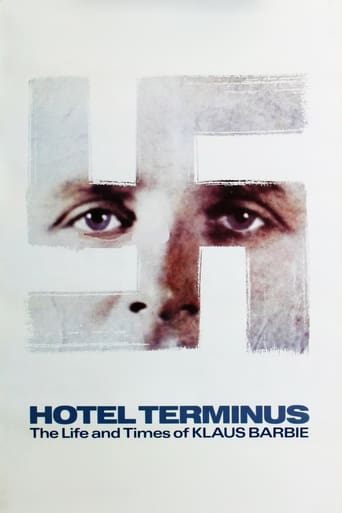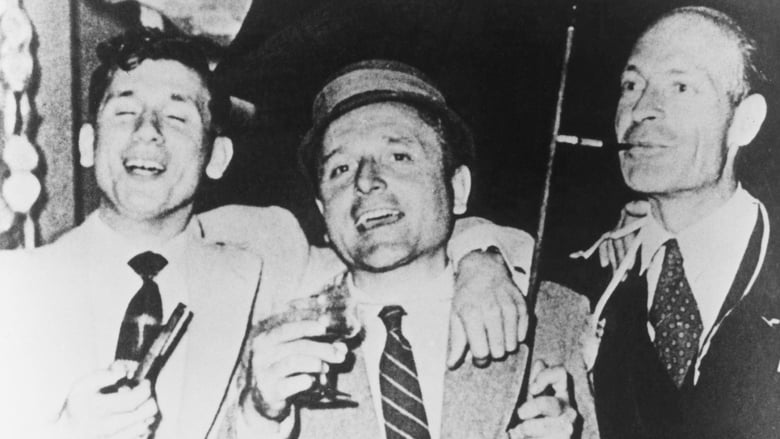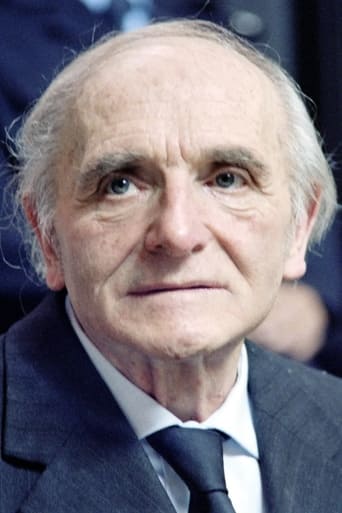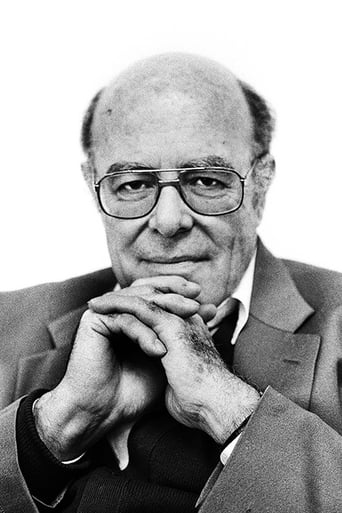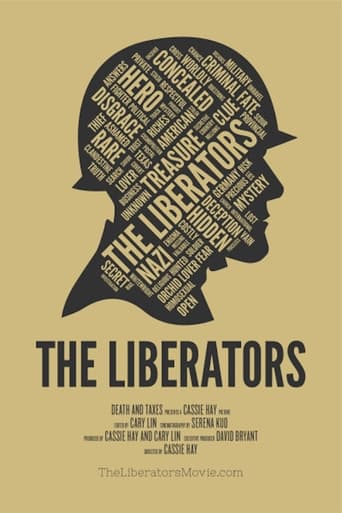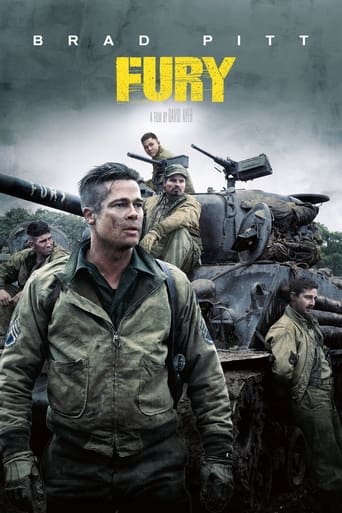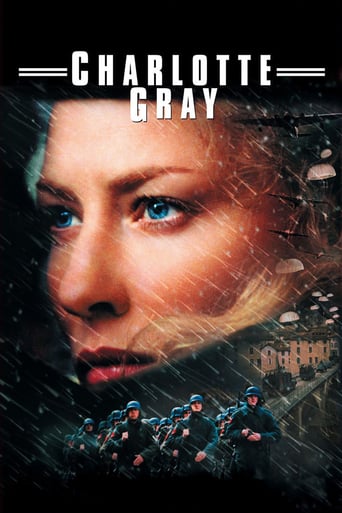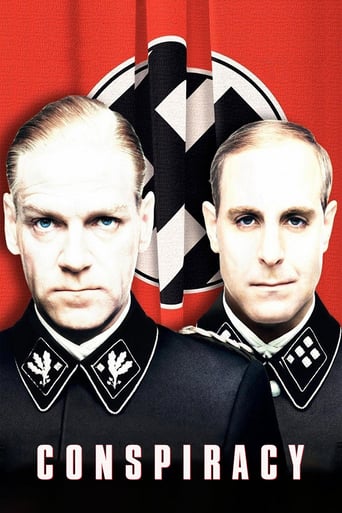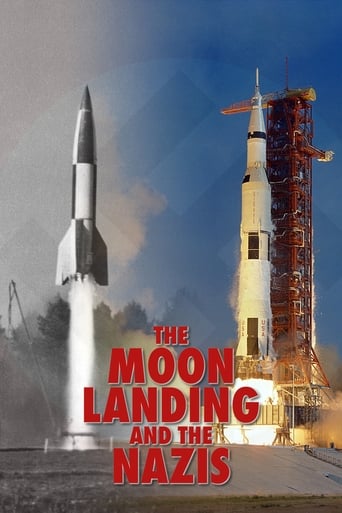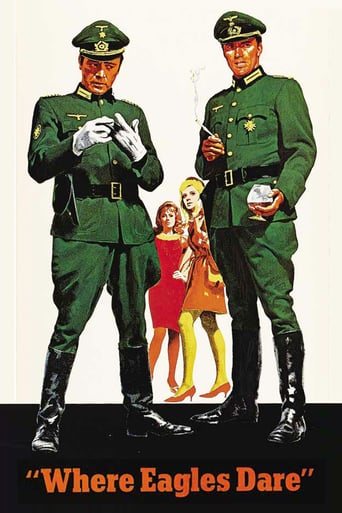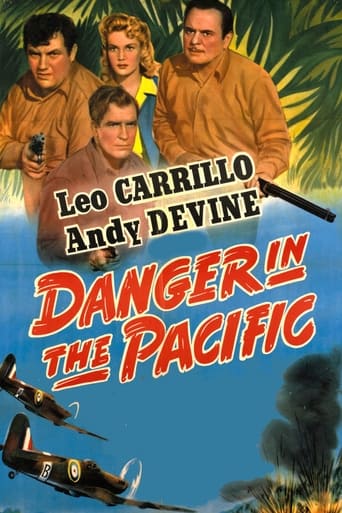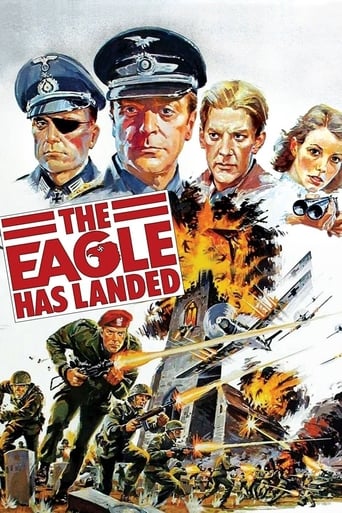Hôtel Terminus: The Life and Times of Klaus Barbie (1988)
Marcel Ophuls' riveting film details the heinous legacy of the Gestapo head dubbed "The Butcher of Lyon." Responsible for over 4,000 deaths in occupied France during World War II, Barbie would escape—with U.S. help—to South America in 1951, where he lived until a global manhunt led to his 1983 arrest and subsequent trial.
Watch Trailer
Free Trial Channels
Cast


Similar titles
Reviews
everything you have heard about this movie is true.
As Good As It Gets
While it doesn't offer any answers, it both thrills and makes you think.
A terrific literary drama and character piece that shows how the process of creating art can be seen differently by those doing it and those looking at it from the outside.
I found this on Hulu, and I am obsessed with movies about WWII (the Holocaust in particular). Armed with my smartphone, I dove in. Initially, I was confused because the director/interviewer jumps into the French Revolution shortly after having some associates of Klaus Barbie describe his childhood. Then these leaders of the Revolution start talking about the betrayal of Jean Moulin. I had to hit pause and check it out on the web. After getting a bit more background, I moved on. I was disgusted when I heard back pedaling from Rene Hardy and Francoise Hemmerle. Ultimately learning that Hardy was framed, and seeing an interview with him towards the end of his life, I did start to pity him. However this Hemmerle woman would chuckle when talking about atrocities of torture then say "oh, I helped I the resistance, then proceeds to refer to the film 'Night & Fog' as "propaganda". This is where the running theme of "oh it was so long ago." This seems to be a running theme with the people who helped this butcher later on. The narrator really doesn't talk much about the Holocaust too much during the film, but focuses on the CIC (American intelligence) utilized Barbie as an informant. Woah, stop the bus! Then what really foxed me was if you Google any of these Americans, not a whisper. The person who drove me insane with his non-answers was a certain Eugene Kolb, who was Barbie's handler. He states that based on his relationship with Barbie, he doesn't believe he needed to use torture to get information out of people. I think that is similar to saying the Holocaust didn't happen. Every word out of his mouth is a contradiction or a back pedal. I knew that the US wanted nothing to do with the Jews until the very end of the war. This disgusts me as a human being. The film moves along with more people who "were just doing their jobs" (much like those who dropped Zyklon B into gas chambers) in the hunt and capture of Klaus Barbie. Turns out, that Barbie was involved in the capture of Che Guevara. The film alludes to this, but that was another topic of my own research. One person who is actually more candid than you would think is Barbie's former bodyguard. He was apprehensive at first, but through his story he tells of how he has to get people to go shopping for him as he was persona non grata in Bolivia. I think he realizes as he is speaking with Maurice that if he tells the truth, it may benefit him. It's a bit of a buildup, but watching him break is rather interesting. Well, as most know, there comes a point Barbie needs a lawyer at his trial. This lawyer is Jaques Verges, a well known defender of terrorists from Palestine and Algeria, and also a cohort of the leaders of the Khmer Rouge (this I learned more about from another film, Terror's Advocate). He did what he did more because he wanted France to acknowledge what they did to the French in Lyon and in Algeria. This is touched on, but never fully explained. The jury to me is still out on him, only because there is logic behind his intentions, even though I don't agree with him politically, or on a level of humanity. I won't ruin the end, but this four hour documentary is well worth the watch. I will say that it would be wise to get caught up on the French Resistance a little beforehand. Because I was so interested, I purchased The Sorrow and the Pity, so stay tuned for that review!
Marcel Ophuls, son of esteemed film director Max Ophuls, directs "Hotel Terminus", an award winning documentary about Nazi war criminal Klaus Barbie. Beginning in childhood, and therefore innocence, and ending with Klaus becoming "the Butcher of Lyon", the film traces Klaus' life by assembling over forty years of footage and interviews culled from over 120 hours of discussion with former Nazis, American intelligence officers, South American government officials, victims of Nazi atrocities and witnesses.A Gestapo Chief in Lyon, Klaus was responsible for torturing and murdering resistance fighters, Jewish men, woman and children, and had thousands deported to Hitler's death camps. After the war, like many German and SS officers, he was protected by and worked with the US Army, who hid him in Bolivia where he lived for 3 decades as a business man. It was only in 1987, when the Cold War was drawing to a close, and with it Klaus' usefulness to the US, that Klaus was brought to trial in a French courtroom for crimes against humanity.Ophuls paints a truly complex portrait of evil, his film highlighting how responsibility is diffused in hierarchal structures, how Communist paranoia resulted in many Nazi officers being willingly absorbed by the amnesic Allies, and delineating the various forces which allowed Klaus to survive after the war. A stand out scene involves Ophuls (himself German born) revealing his Jewish identity to an associate of Klaus, but much of this 4 and a half hour documentary is rather low key, revoking easy sensationalism for an objective, probing tone.Surprisingly, the film has a comedic streak, Ophuls pointing out the inconsistencies in testimonies, undermining the statements of various German officers with clever quips and using German folksongs as an ironic counterpoint to several scenes. 9/10 – Worth one viewing. Makes a good companion piece to Ophuls' "The Sorrow and the Pity". See "The Conformist".
This is a riveting film from start to finish. Marcel Ophuls very personal and wry take on the unfolding horror of Nazi Klaus Barbie's long and unimpeded criminal career exerts a powerful hold. The movie exudes a weird, creepy humor throughout, beginning with its title, the actual name of the French hotel which was the location of Barbie's headquarters in Lyons. "Hotel Terminus" is filled with unforgettably bizarre, real life characters. The voices of Barbie's torture victims and pursuers are given equal time alongside those of his collaborators and defenders. This is an important movie. It stands as one of the best documentaries of the twentieth century and of all time. The film is as much or more about French history as well as American and German. The United States ugly,collaborative role in Barbie's eluding of justice for so many years is revealed in terms like "ratline". The ratline was a transportation corridor set up by the CIA to funnel Nazi war criminals safely out of Europe to South America. This operation functioned with the help of the Vatican.It was fueled by the turn of the political tide after World War Two when fear of Communist takeover took hold over Europe and the West, and the Nazis were seen as specialists in their ability to ferret out Communists. There are numerous subtitles throughout, especially in Part one, but these do not detract from the film's unstoppable momentum. Parts of this true story seem almost unbelievable. Hannah Arendt's observation and comment on the banality of evil is again and again underscored in Ophuls extraordinary film.
I saw "Hôtel Terminus" as part of a cycle of films dealing with Second World War, its protagonists and its effects. This was the last in the series in chronological order, but the first I saw: it was the only one dealing with modern consequences of that war. The film is what some people call a "talking heads", referring to documentaries made primarily of interviews. I did not know the term and heard it for the first time in the late 1980's in the Havana Film School. Students used it in a derogatory way. But as we all know, some talking heads are good. This one is, and a very good one. I am supposing that most everybody knows that Klaus Barbie was a Nazi agent, a torturer, then an anti-Communist spy for the CIA, that he escaped from Europe with the help of the Catholic Church and that he finally dealt with gun traffic in South America. He was caught, sent to France and judged in Lyon. In four hours and a half, Marcel Ophüls (who is not a very nice subject on camera), not only reconstructs Barbie's life, but he covers so much ground that it's noteworthy how his editors were able to maintain one's attention in so many persons, facts, dates and abundant references in the testimonies. I have been told that the film worked as an alert for the resurgence of neo-Nazis and the so-called "ordinary fascism". Well, it should be seen every now and then, because it seems that as long as there are human beings there will be totalitarians, traitors and assassins, and as long as there is a group of nations that want to control the world, there will be new holocausts. We all know that because of all the Klaus Barbies we have seen in power. This one won the Oscar as Best Documentary.

